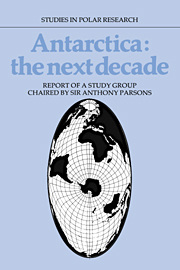Book contents
- Frontmatter
- Contents
- Acronyms
- The Study Group
- Preface
- Political map of Antarctica
- Geographical map of Antarctica
- Part I The Antarctic Treaty System under stress?
- Part II Uses of Antarctica
- 4 Science
- 5 Living resources and conservation
- 6 Mineral resources
- 7 Military potential
- Part III The future
- Appendices
- Notes and references
- Index
6 - Mineral resources
Published online by Cambridge University Press: 04 August 2010
- Frontmatter
- Contents
- Acronyms
- The Study Group
- Preface
- Political map of Antarctica
- Geographical map of Antarctica
- Part I The Antarctic Treaty System under stress?
- Part II Uses of Antarctica
- 4 Science
- 5 Living resources and conservation
- 6 Mineral resources
- 7 Military potential
- Part III The future
- Appendices
- Notes and references
- Index
Summary
Ever since the Glomar Challenger (1972–73) detected traces of methane and ethane in the Ross Sea, the oil search has been on, with even official US reports talking about ‘tens of billions of barrels’. And although difficulties and costs would be astronomic – possibly twice those at Alaska's Prudhoe Bay – the searchers are not noticeably dismayed. Norway and West Germany have been looking in the East Weddell Sea, Japan has just completed a three-year trawl through Bellingshausen, Weddell and Ross, France is active off Terre Adélie, Australia has had a look at the Amery Ice Shelf, and the Soviets in the Drake Passage, with aeromagnetic surveys over the Filchner, Ronne and Amery ice shelves. Even the Poles have been echo-sounding in the Peninsula.
Reading this extravagent assertion about the search [sic] for hydrocarbons in Antarctica, one immediately asks how this accords with the facts. Even assuming that there are hydrocarbon or other mineral resources, could they be exploited economically and in an environmentally acceptable way? To what extent could the experience of mineral exploitation in the Arctic be extrapolated to the Antarctic? These are just a few of the many questions that come to mind. This chapter attempts to assess the likelihood of mineral exploration and exploitation in the light of what is known and, more importantly, what is not known about Antarctica.
- Type
- Chapter
- Information
- Antarctica: The Next DecadeReport of a Group Study Chaired by Sir Anthony Parsons, pp. 76 - 97Publisher: Cambridge University PressPrint publication year: 1987



